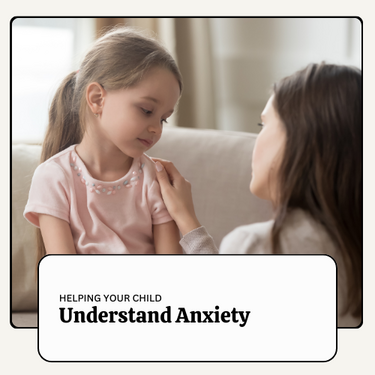
No parent wants to think about their child dealing with anxiety. But, it’s an unfortunate reality. In fact, children are often more susceptible to anxiety and depression when faced with challenging or uncertain situations.
That’s one of the reasons why so many children and teens have started to experience mental health issues throughout the COVID-19 pandemic. It’s important for parents, and all adults, to realize that kids can experience the same kind of anxiety as anyone else.
The difference? They might not be able to easily identify it or know how to cope. That’s when it’s time to step in and talk to them about anxiety in a way they can understand.
Obviously, you aren’t going to explain anxiety to your five-year-old the same way you would with a preteen. So, how can you make the right conversational choices that are developmentally appropriate?
Encourage Your Child to Open Up at Every Age
A good place to open up the conversation about anxiety is to encourage your child to talk about their feelings. This is something you can do no matter how young they are. How you might approach it could be different for various age groups. But, kids talking about their feelings is healthy.
As your child gets older, pay attention to any signs of anxiety they might be dealing with and talk to them specifically about how they are/were feeling during certain situations.
For example, if your child seems to get nervous or on edge whenever you’re out in public with them, you might say something like, “I noticed you got very quiet yesterday at the mall and seemed a bit nervous. What were you feeling?”
Sometimes, an open window is all it takes. Give your child every opportunity to share their feelings with you by giving them that window.
Educate Them
When your child is old enough to understand what anxiety is, don’t shy away from it. Instead, educate them. Share facts, common symptoms, and even some potential causes.
For older kids, especially, this kind of education is important. They may have been struggling silently for a while, not knowing what to think. Understanding that anxiety is real and other people are dealing with it can make any child more comfortable opening up about their own experience(s).
Educating them also means helping them recognize the signs. Anxiety can present itself through thoughts, feelings, and actions. Discuss what to expect from those different areas, and talk to your child about ways they’ve felt anxiety before.
There are some common symptoms associated with anxiety, but everyone can experience different things. Make sure your child knows that. Anxiety can’t be “kept in a box.” Your child understanding how their own reactions take place will be crucial for them to recognize they need help.
Be Their Support
Young children may not understand every aspect of anxiety. Then again, many adults don’t, either. The most important things for them to know are that they aren’t alone in how they feel, and they won’t be alone as they work through it.
Be a familial support system for your child at any age. As a parent, observe as much as possible. Try to learn their common symptoms and even potential triggers. The more you understand your child’s anxiety, specifically, the more help and support you can offer.
In some cases, if your child is old enough, they can benefit from talking to a therapist or counselor. It’s another great option for them to open up, learn more about their feelings, and find effective ways to manage anxiety on their own. It doesn’t have to be something they carry into adulthood when it’s managed properly now.
Is your child or teen struggling with anxiety or excessive worries? Don't wait to get help!
While it might not be easy to think about you or your child/teen seeing a therapist or counselor, it’s often the best way to get support. And virtual counseling is convenient and easy. Connect with a qualified mental health provider in our directory.

Sign up for our newsletter to get instant access to parenting resources sent directly in your inbox!
